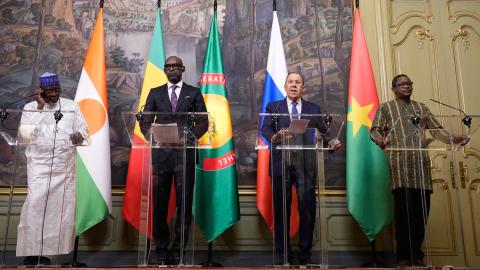As President Donald Trump seeks a breakthrough with Putin on Ukraine, the Kremlin is stalling—and making gains elsewhere. While Washington remains absorbed in Eastern Europe, Moscow is expanding its reach in Africa, pushing steadily toward the Atlantic coast. Working under the radar, Russia is building military outposts, securing defense agreements, and shifting the regional balance from the Red Sea to West Africa.
If the Trump administration fails to respond, the Kremlin will lock in another strategic foothold on NATO’s southern flank. And it won’t be alone: Russia is deepening coordination with China and Iran, forming a hostile axis intent on challenging Western dominance across multiple theaters—land, sea, air, and the airwaves.
The U.S. withdrawal from Niger—following France’s expulsion from Senegal, Mali, and Burkina Faso—mark the collapse of Western footholds in the Sahel. As the West retreats, Russia is rapidly filling the vacuum, embedding itself in security structures and expanding its influence beyond its borders. And it’s not just political influence—Russia is Africa’s top arms supplier, accounting for 40 percent of the continent’s weapon imports.
This isn’t mere opportunism—it’s Putin’s asymmetric warfare at work. Arming juntas, backing coups, and exploiting chaos, Moscow is seizing the power vacuums left by the West. At a summit in Sochi last November, Puti vowed: “Our country will continue to provide total support to our African friends.”
Moscow’s growing influence in Burkina Faso, Mali, and Niger—the newly formed Alliance of Sahel States (AES)—signals a clear trajectory. Between 2020 and 2023, military juntas in these countries seized power through Russian-backed coups, ending military and diplomatic ties with regional allies, France, and the United States. Now, they are deepening security cooperation under Moscow’s guidance. A joint force of 5,000 troops from Niger, Burkina Faso, and Mali will to deploy in the central Sahel, reinforcing Russian influence while sidelining Western-backed security structures.
But Russia isn’t just backing these regimes—it’s rewiring Africa’s security architecture through its shadowy mercenary corporation Wagner PMC. More than a paramilitary group, Wagner is a strategic weapon for embedding in security forces and reshaping the region’s balance of power. By supplying military aid and diplomatic cover, Moscow is making itself the backbone of their survival, ensuring long-term control over the region’s future.
Moscow is now extending this strategy beyond the Sahel to the Atlantic coast. In Mauritania, Foreign Minister Sergey Lavrov’s 2023 visit was part of a broader Russian diplomatic push. While the Mauritanian government reaffirmed its commitment to international law, it also expressed that it “understands” Russia’s security concerns—proof that Moscow’s narrative is gaining traction.




















